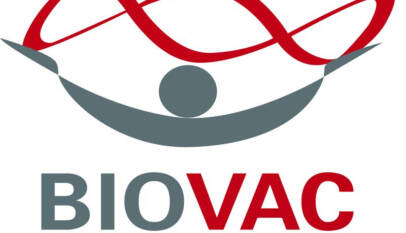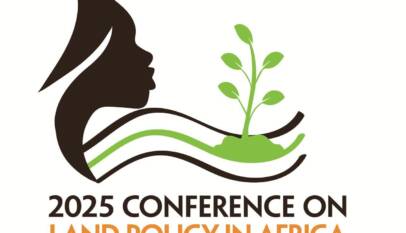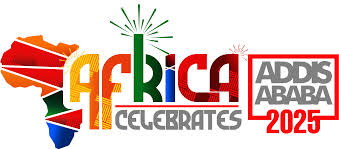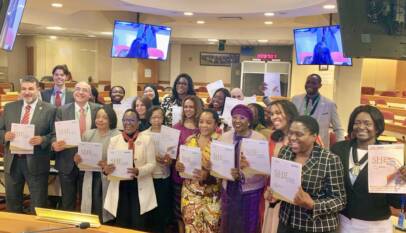2021 WIBEF Summit: Positioning women-owned MSMEs to thrive amidst Covid-19 chaos
The Covid-19 global health emergency has thrown many MSMEs into chaos while others have closed down altogether. In a bid to build resilience amidst the pandemic’s crippling challenges, New Faces New Voices (NFNV) Nigeria’s virtual WIBEF Summit themed: “Thriving in chaos” sought to unlock strategies for ensuring women-owned MSMEs flourish amidst the Covid-19 chaos.

By Stephen Enoch
The 2021 Women in Business, Export and Finance (WIBEF) Summit of NFNV Nigeria took place virtually, exploring strategies for ensuring women-owned MSMEs thrive amidst the Covid-19 disruption as well as the crucial role of investment in agricultural technology in resolving low productivity in Nigeria’s food production.
Thus, the Summit which was supported by United Parcel Service (UPS), NFNV Nigeria’s longstanding partner, featured conversations on unravelling growth opportunities across the agricultural value chain towards a strengthened agribusiness value chain.
NFNV is an initiative of the Graça Machel Trust (GMT) whose mission is advocating for African women’s access to finance and allied services through strategies aimed at the advancement of women within the financial sector as well as eliminating obstacles relating to funding of women-owned businesses in Africa. The nonprofit is also focused on promoting policy and legislative changes aimed at mainstreaming of women in the formal financial sector.
Ms Aishatu Debola Aminu, Country Director of NFNV Nigeria, while welcoming participants to the Summit, said the two-day forum sought to empower women in business by fostering resilience to entrepreneurship challenges, particularly amidst the uncertainties brought about by Covid-19. Ms Aminu therefore said the Summit would help the business women discover innovative ways to respond to the challenges posed by the pandemic which would enable them gain more visibility and achieve maximum impact across their respective sectors.
“With the continued easing of Covid-19 restrictions across the world, women entrepreneurs are encumbered with the new rules of doing business. This Summit would offer strategies and skills for addressing the challenges of the current business realities. NFNV Nigeria is also in the process of institutionalizing collaborations and partnerships with government agencies and private sector organisations in the agricultural sector for our members operating in this value chain,” Ms Aminu said.
While speaking on the theme of the Summit, Ms Cecilia Akintomide, the Chairperson of Global Sanitation and Hygiene Fund (SHF) and Member of the Board of Trustees of NFNV Nigeria, said the economic impact of the Covid-19 pandemic was three times worse than that of the 2008 global financial crisis, hence the prevailing poor state of the Nigerian economy.
“Despite the failure of businesses and depreciation of the naira, certain businesses like Opay and Flutterwave are surprisingly flourishing. The index step to thriving in chaos for MSMEs is having a clear understanding of the true state of their businesses alongside having a clear knowledge of the damages they had suffered, in order to initiate a resolute response. Seeking professional assistance in evaluating the root causes of the challenges is integral to enhancing accurate responses,” Ms Akintomide explained.
While speaking further on opportunities and essential strategies for thriving in chaos, Ms Akintomide said countless organizations globally and locally, were available to assist MSMEs thrive amidst the current challenging times. She however stressed that such supportive opportunities were not easily accessible and therefore encouraged the entrepreneurs to actively seek out for information about such organizations and the opportunities they present through attending webinars and engaging in networking activities.
“In situations where businesses do not seem to progress, it is important to consider partnerships because partnerships could help reduce costs, increase productivity as well as helping in accessing opportunities. In a time where digitalization is key to thriving, training and capacity building for team members to leverage digital technology-driven opportunities is crucial. It is also important to develop a broader vision for a business even if it is confined at the point of its startup,” Ms Akintomide concluded.
While engaging the participants on Low Productivity in Business across Nigeria, Dr Femi Egbesola, President of the Association of Small Business Owners of Nigeria (ASBON), described poor managerial skills as one of the crucial challenges faced by MSMEs since many business owners ignorantly venture into entrepreneurship without the requisite business education. This, he said, oftentimes results in poor leadership and decision making in business.
In addition, Dr Egbesola identified financial illiteracy, poor infrastructure, lack of funding, government regulations and bureaucracies as key factors bedeviling the growth of most MSMEs and for which they continue to struggle with poor outcomes. Accordingly, he proffered strategies for overcoming such challenges.
“E-commerce is the easiest way of doing business today, owing to its wide reach and opportunity for digital growth. Also, insuring businesses is imperative for protecting MSMEs in times of troubles. MSMEs should develop and implement action plans with potentials for stabilizing their businesses, building resilience and adapting to new realities whenever the need arises. Moreover, assets or properties which do not generate revenues should be disposed of. Diversification to essential businesses such as food production and agro-allied processing is also key,” he explained.
While speaking on leveraging technology to maximize results, Mr John Odubele, Managing Consultant at TMD Global Consulting and lead consultant for NFNV Nigeria, said automating businesses would halt leakages and boost profitability. Mr Odubele said there were freely available applications for automating business processes online adding that such applications could help MSMEs avoid having to employ staff to carry out such processes.
“Maximising workable automated solutions reduces the cost of doing business. Platforms where goods can be acquired online such as Jumia and Konga offer a lot of opportunities. One could partner with such e-commerce sites to market and sell products on their behalf at a minimal cost. Acquiring voice over Internet Protocol (VoIPs) which enable phone calls online would reduce the airtime cost associated with traditional phone calls, thereby boosting productivity at significantly reduced cost.”
Having acquired various strategies for growing their businesses and managing crises situations, most importantly exploring prospects of thriving amidst the Covid-19-induced chaos, women in agribusiness, trade, export and finance who participated at NFNV Nigeria’s WIBEF Summit had given inspiring feedback regarding their takeaways from the Summit. Reproduced below are some their testimonies;
- “This was a very useful session. I gained a lot, I am also interested in more trainings after this session”
- “WIBEF Summit 2021 content was rich, very relatable and practicable. I will put all that I have learnt into practice.”
- “Congratulations for a successful WIBEF Summit. It is more like a master-class and hand-holding two-day session.”
- “This summit is a game changer for my business especially during this post-COVID-19 times.”
















